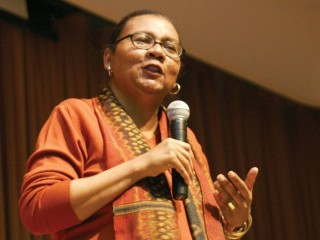
Bell Hooks biography
Date of birth : 1952-09-25
Date of death : -
Birthplace : Hopkinsville, Kentucky
Nationality : African-American
Category : Famous Figures
Last modified : 2010-10-05
Credited as : Writer and activist, educator, "Black Women and Feminism"
0 votes so far
Childhood
Born Gloria Jean Watkins on September 25, 1952, bell hooks was raised in Hopkinsville, Kentucky, a small, segregated (separated by race) town in rural Kentucky. She recalled her neighborhood as a "world where folks were content to get by on a little, where Baba, mama's mother, made soap, dug fishing worms, set traps for rabbits, made butter and wine, sewed quilts, and wrung the necks of chickens." She later explained how this community turned the hardships created by racism (the idea that one race is superior to another) into a source of strength. The neighborhood where she grew up provided young Gloria with her resistance to racism, but it also provided her with the negative and positive experiences that would shape her feminism (support of equal rights for women).
Gloria was one of six siblings: five sisters and a baby brother. Her father worked as a janitor, and her mother, Rosa Bell Oldham Watkins, worked as a maid in the homes of white families. As a student at segregated public schools, hooks was taught by a dedicated group of teachers, mostly single black women, who helped to shape the self-esteem (satisfaction with oneself) of children of color. But the late 1960s Kentucky schools became desegregated. By the time she was ten, hooks had begun writing her own poetry and soon developed a reputation for her ability to recite poetry.
Learned to "talk back"
Although hooks was supposed to become a quiet, well-behaved young woman, she became instead a woman who "talked back." This action, for which hooks eventually named a volume of essays, actually refers to the development of a strong sense of self that allows black women to speak out against racism and sexism.
Although young hooks continued to write poetry—some of which was published—she gained a reputation as a writer of critical essays on systems of domination. In order to do this work, she found that she needed to develop a different voice, a different name. She first used her pseudonym (assumed name)—her maternal great-grandmother's name—for a small book of poems. She decided not to capitalize her first and last names in an attempt to place the focus on her work, rather than her name.
Wrote first book at nineteen
After high school, hooks accepted a scholarship to Stanford University, in California. Despite her full-time studies she began Ain't I a Woman at the age of nineteen. She also took a job as a telephone operator. Finding time for her writing was a challenge, but hooks found that the job offered her something she did not have in school at the time—a community of working-class, black women.
The author went through several drafts of the manuscript over the next six years before she had one that satisfied her. It was at this moment that the persona of bell hooks truly rescued Gloria Watkins. At first hooks had considerable trouble publishing her work, and eventually she was directed to her future publisher, South End Press, while giving a talk at a feminist bookstore in San Francisco. Once published in 1981, Ain't I a Woman became a central book in discussions of racism and sexism. Eleven years later, Publishers Weekly ranked it among the "twenty most influential women's books of the previous twenty years."
A career in higher education
While Ain't I a Woman made bell hooks an important name in feminist debate, she continued her work. After obtaining a doctorate degree in English literature, she began her teaching career. It was in her role as a teacher that hooks felt she was doing her most important work. She knew that for a people historically and legally denied the right to education, teaching was one of the most substantial forms of political resistance she could choose.
After holding various positions at the University of California in Santa Cruz, California, in the early 1980s, hooks left for Yale University in New Haven, Connecticut, when she had the opportunity to teach in African American Studies. In 1988 she joined the faculty at Oberlin College, in Ohio, where she would teach in Women's Studies, a program that now offered the critique of racism that was absent during her undergraduate years.
Taking a post with the City College of New York in 1995, hooks moved to the Henry Holt publishing company and came out with Killing Rage: Ending Racism, a book that calls for a more proactive approach (initiative) to solving the problem of racism in America.
Hooks lives in New York City and remains an important figure in the fight against racism and sexism in America. With the release of Communion: The Female Search for Love in 2002, hooks has more than twenty books to her name with more to come.
















